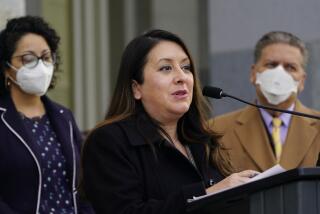Waters Plans to Continue CIA-Crack Link Probe
- Share via
NORTHRIDGE — Fresh from a fact-finding trip to Nicaragua, Rep. Maxine Waters (D-Los Angeles) told an attentive audience at Cal State Northridge on Thursday that she planned to continue investigating charges that the CIA had a role in the crack boom that has crippled sections of her South Los Angeles district.
“I went to Nicaragua recently and met with someone in prison,” she said to the racially diverse crowd of students and teachers. “And I will go back again if I have to. I’m going to go wherever the story takes me.
“And I’m going to do everything I can to find out what was happening then, what may be happening now and whether my government was involved in trafficking.”
During her 50-minute speech sponsored by CSUN’s Pan-African Studies department, Waters said she is skeptical that the CIA or any local law enforcement agencies, including the Los Angeles Police Department and Los Angeles County Sheriff’s Department, will provide any solid help in investigating the controversial case.
The CIA has denied knowledge of any links between any CIA-supported Contra rebel groups and Los Angeles cocaine dealers.
“What we need to find out is: Who knew what? When did they know it? And how high did it go?” Waters said.
She told the crowd that the crack cocaine explosion has had far-reaching effects for African Americans. She cited a recent study by a sentencing group that said that of black males of voting age, one in seven, or about 1.6 million, are currently or permanently disenfranchised from voting as a result of felony convictions.
Many of those convictions are related to crack cocaine sales. This figure, she says, is an example of how deeply the crack cocaine trade of the 1980s has not only affected families in her area, but has also decreased black voting power.
A few weeks ago, Waters traveled to Granada, Nicaragua, to interview Enrique Miranda Jaime, a former associate of admitted drug dealer and Contra sympathizer Norwin Meneses. Waters described Meneses as a key figure in crack cocaine trafficking in Los Angeles.
Waters said that her trip to the prison, 25 miles from the capital city of Managua, produced new information, but she declined to discuss it in detail in her CSUN talk, saying she wanted to first relay it to federal officials. She did say that after her visit, Jaime was placed in isolation at the prison.
She said she has urged FBI officials to place him in their Witness Protection Program, because he may be an important witness in possible hearings.
Waters, who worked her way up from a job waiting tables to her recent appointment to the powerful position of chairwoman of the Black Congressional Caucus, said that despite disagreements about the role of the CIA in the drug trade, the media attention surrounding the series of stories written by the San Jose Mercury News has sparked much-needed debate about the war on drugs.
Marcee McAfee-Clark, a CSUN graduate student who helped bring Waters to the campus, said the fiery politician is a “living legend” and was the perfect person to launch Black History Month at the campus.
“She is a current event,” McAfee-Clark said. “She is the most knowledgeable person about this issue and since our aim this year is to be proactive, we figured she was more timely rather than bringing someone to talk about what happened in the past for black people.”
More to Read
Get the L.A. Times Politics newsletter
Deeply reported insights into legislation, politics and policy from Sacramento, Washington and beyond. In your inbox twice per week.
You may occasionally receive promotional content from the Los Angeles Times.










